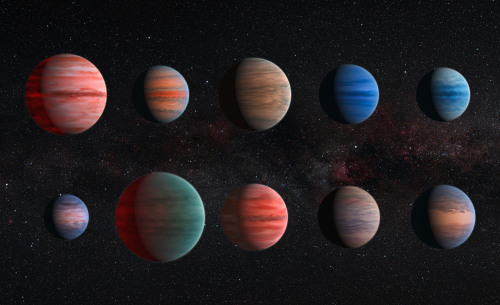River Valley
River Valley

Picture of the day - October 30, 2018
Best shot yet of a river valley I have found, taken on an Earth-like world. The planet has a unique yellow-colored atmosphere.
More Posts from Sharkspaceengine and Others

Picture of the Day 2 - November 13, 2018
A ringed desert world located in the core of the Large Magellanic Cloud Galaxy. There are nearly 116 stars within just 1 light year of this planet.

Picture of the day - December 12, 2018
Moon rise over Insight B-V. The second sun is also visible in this pic.
Hot Jupiter
Planets in our own solar system have a wide range of properties. They are distinguished by two basic properties, their size and their orbit. The size determines if the planet can have a life-sustaining atmosphere. The orbit affects the surface temperature and whether there could be liquid water on the planet’s surface.

Hot Jupiters are a class of gas giant exoplanets that are inferred to be physically similar to Jupiter but that have very short orbital period (P<10 days). The close proximity to their stars and high surface-atmosphere temperatures resulted in the moniker “hot Jupiters”.

Hot Jupiters are the easiest extrasolar planets to detect via the radial-velocity method, because the oscillations they induce in their parent stars’ motion are relatively large and rapid compared to those of other known types of planets.

One of the best-known hot Jupiters is 51 Pegasi b. Discovered in 1995, it was the first extrasolar planet found orbiting a Sun-like star. 51 Pegasi b has an orbital period of about 4 days.

There are two general schools of thought regarding the origin of hot Jupiters: formation at a distance followed by inward migration and in-situ formation at the distances at which they’re currently observed. The prevalent view is migration.

Migration
In the migration hypothesis, a hot Jupiter forms beyond the frost line, from rock, ice, and gases via the core accretion method of planetary formation. The planet then migrates inwards to the star where it eventually forms a stable orbit. The planet may have migrated inwar.
In situ
Instead of being gas giants that migrated inward, in an alternate hypothesis the cores of the hot Jupiters began as more common super-Earths which accreted their gas envelopes at their current locations, becoming gas giants in situ. The super-Earths providing the cores in this hypothesis could have formed either in situ or at greater distances and have undergone migration before acquiring their gas envelopes.

source

Picture of the day - February 15, 2019
Gas giant with vivid violet rings.

Picture of the day - January 3, 2019
Desert-like moon orbiting a large gas giant. This is the same world as the skylines from the previous post.

The northern pole of a large moon orbiting the blue gas giant. The clouds like structures visible are two galaxies in the process of colliding.





Pictures of the Day December 1, 2018
Insight System - Insight B-II
The second planet orbiting Insight B. This world is a more extreme version of Venus that is choked in a thick carbon dioxide atmosphere 427 times thicker than Earths. Unlike Venus, the atmosphere is humid, water vapor comprises 6.45% of the planet’s atmosphere, further amplifying the greenhouse effect of the atmosphere.
Insight B-II is a super earth with approximately 5.28 Earth’s masses, and a radius of 1.39 Earth Radii. The planet is quite dense and has a surface gravity of 2.7 g. Such a high surface gravity flattens the ground and results in only small elevation changes across the entire surface of the planet. The planet is tidally locked to the sun and orbiting at a distance of 0.09 AU. Surface temperatures average 1,182 F. Most of the surface consists of broad plains covered in shallow sand dunes.
High Resolution Pictures
Insight B-II
Approaching the atmosphere
Storms
Daytime sky
Twilight sky







Oculus System - Post 3 (Cratered Wasteland)
The system’s third planet is a nearly airless Mars-sized world, heavily cratered world. The planet orbits 1.19 AU from the sun, has a mass of just 8.6% that of Earth and roughly half of Earth’s diameter. A tenuous carbon dioxide atmosphere clings to the surface with a surface press of just 1/100,000th that of Earth. Surface temperatures can reach the boiling point of water during the day, and fall nearly -300 °F at night.
High Resolution Pics
Picture 1 - Mercury-like planet
Picture 2 - Two small satellites
Picture 3 - A view from a moon
Picture 4 - Setting Sun.
Picture 5 - Broken Crater
Picture 6 - From just 10 km above the surface.
Picture 7 - The Surface
My Space Engine Adventures, also any space related topic or news. www.spaceengine.org to download space engine. The game is free by the way. Please feel free to ask me anything, provide suggestions on systems to visit or post any space related topic.Check out my other blog https://bunsandsharks.tumblr.com for rabbit and shark blog.
294 posts

